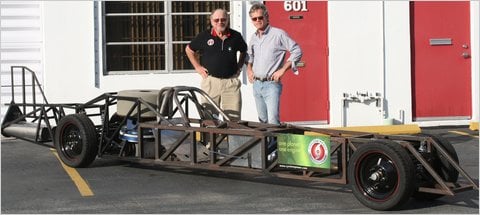cybercore
New Member
- Joined
- Jul 7, 2009
- Messages
- 15,641
- Thread Author
- #1

Full steam ahead! Cyclone Power Technologies founder Harry Schoell and Chuk Williams, head of the U.S. Land Steam Record Team, stand in front of a car designed to set a land speed record for steam-powered vehicles.
We usually think of steam powering things such as old-fashioned riverboats, locomotives and tea kettles. But a team of steam-punk speed freaks says hot air has a place on the road.
Chuk Williams is striving to set a land speed record in a custom-built race car outfitted with a steam-powered engine.
As early as August, Williams and the metalheads at Cyclone Engines could head to Utah's Bonneville Salt Flats in an attempt to make history, according to the New York Times' Wheels Blog.
Even though steam might not sound like cutting-edge technology, the engine-makers insist their machine is perfect for the road -- not to mention trains, trucks, generators and gardening equipment.
The Cyclone engine can process a number of fuels -- from standard gasoline to biofuels -- to rapidly heat water-filled coils. The steam inside the coils powers the engine's pistons, then turns back into water, creating a closed-loop system.
That leads to very low emissions and a lower carbon footprint than standard combustion engines -- not to mention enough horsepower to get a race car to speeds greater than 160 mph, according to Harry Schoell, Cyclone's chief executive.
"Our calculations show that we can break this record with our stock automotive engine," Schoell said. "We can turn higher rpm levels at the same torque figure and will do so in the race car."
More Steam-Powered Race Car Out to Set World Record
Last edited by a moderator: